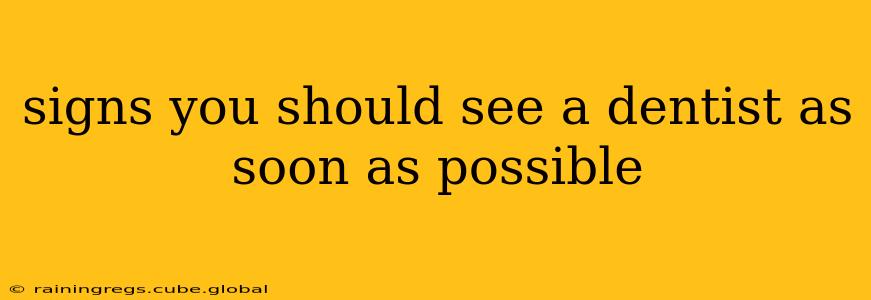Experiencing dental pain or discomfort can be incredibly disruptive. Knowing when a problem requires immediate attention from a dentist is crucial for preventing further complications and ensuring your oral health. This guide will outline several key signs indicating you should schedule an urgent dental appointment as soon as possible.
Severe Toothache: When Pain Can't Be Ignored
A persistent, throbbing toothache that doesn't subside with over-the-counter pain relievers is a major red flag. This could indicate a range of issues, from a cavity that has progressed to the nerve, an abscessed tooth (a serious infection), or a cracked tooth. Delaying treatment can lead to infection spreading, potentially requiring more extensive and costly procedures.
What to do if you have a severe toothache?
Take over-the-counter pain medication as directed, but don't rely on it solely. Contact your dentist immediately to schedule an appointment. Applying a cold compress to the affected area might offer temporary relief.
Swelling or Abscess Formation: Signs of Infection
Noticeable swelling in your gums, jaw, or face, often accompanied by throbbing pain, points towards a potential infection. An abscess, a pus-filled pocket of infection, is a particularly serious condition requiring prompt medical attention. Abscesses can spread rapidly, leading to more severe health problems if left untreated.
How to recognize an abscess?
Look for a localized swelling that might be tender to the touch. You might also experience fever, chills, or general malaise. Don't attempt to drain the abscess yourself; seek professional dental care immediately.
Bleeding Gums That Won't Stop: Beyond Normal Bleeding
While some bleeding during brushing is relatively common, excessive or persistent bleeding gums is a concern. This could signify gum disease (gingivitis or periodontitis), a serious infection that can damage your gums and even lead to tooth loss if left untreated.
What if my gums bleed excessively?
If you notice persistent bleeding, particularly after brushing or flossing, schedule an appointment. Your dentist can determine the underlying cause and recommend appropriate treatment, potentially including professional cleaning and instruction on improved oral hygiene.
Sudden, Intense Sensitivity to Hot or Cold: More Than Just Sensitivity
While some sensitivity to temperature changes is common, a sudden onset of intense pain when consuming hot or cold foods or drinks warrants immediate attention. This could be a sign of a cracked tooth, a cavity reaching the nerve, or other dental issues requiring prompt evaluation and treatment.
What causes this sudden intense sensitivity?
The underlying cause might be a small crack in the tooth, exposing the nerve. It's important to consult your dentist to pinpoint the problem and avoid further damage.
Loose or Broken Tooth: Addressing Immediate Damage
A loose or broken tooth is a clear emergency that requires immediate professional intervention. Prompt treatment can significantly increase the chances of saving the tooth. Delaying treatment can lead to irreversible damage, including potential tooth loss.
What to do with a loose or broken tooth?
If a tooth is knocked out completely, try to gently rinse it and store it in milk or saliva. Take it to your dentist immediately. If the tooth is broken but still in place, carefully protect it from further injury and seek dental attention promptly.
Persistent Bad Breath: Beyond Normal Breath Odor
While bad breath (halitosis) can stem from various causes, persistent bad breath that doesn't improve with brushing and flossing could be a sign of underlying dental problems, such as gum disease, cavities, or an infection.
How can I tell if bad breath is serious?
If you've tried improving your oral hygiene and the bad breath persists, seek professional evaluation. The cause might be something beyond simple bad breath.
Jaw Pain or TMJ Issues: Discomfort Beyond the Teeth
Pain in your jaw joint (temporomandibular joint or TMJ) can be a symptom of various issues, potentially affecting your ability to chew or open your mouth fully. This could be due to bruxism (teeth grinding), jaw misalignment, or other problems that need professional diagnosis and treatment.
What should I do if my jaw hurts?
If you experience persistent jaw pain that limits your function, it's crucial to see your dentist or a specialist who can diagnose and treat the underlying cause. Ignoring the issue can lead to long-term pain and complications.
This list highlights crucial signs that demand immediate dental attention. Remember, prevention is key – practicing good oral hygiene and visiting your dentist regularly for checkups and cleanings are vital in maintaining optimal oral health. Don't hesitate to contact your dentist if you experience any of the symptoms mentioned above. Early intervention is essential for preserving your teeth and overall health.
